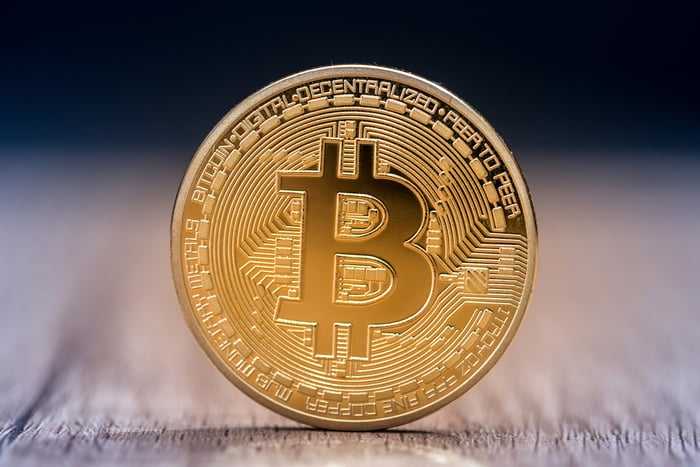If you think the stock market or your portfolio has had a phenomenal return in recent years, it probably pales in comparison to the returns of cryptocurrencies like bitcoin and Ethereum. Over the trailing-two-year period, bitcoin has risen in value by more than 1,800%, while Ethereum is up almost 4,100% year to date! That's nearly 4,100% in eight months, which is what the S&P 500 took more than four decades to return as an index.
Why cryptocurrencies like bitcoin have been unstoppable
There are a handful of reasons why digital currencies are all the rage. Momentum is certainly one of them. Investors are likely seeing triple- and quadruple-digit gains on bitcoin and Ethereum, and they don't want to miss the boat. Given that few financial institutions are involved in cryptocurrencies, and the fact that they lack government backing, they can be moved on whims and emotions. Right now that emotion is decidedly optimistic, which has helped push bitcoin and Ethereum into the stratosphere.

Image source: Getty Images.
The more logic-based catalyst behind bitcoin's and Ethereum's push higher is the use of their underlying digital, decentralized ledger technology known as blockchain. Blockchain has been touted by some pundits as the future of secure transactions, and more than 150 organizations have joined the Enterprise Ethereum Alliance to test Ethereum's blockchain in pilot programs or on a small-scale.
Among cryptocurrencies, bitcoin is the largest by market cap, with a valuation of $72 billion as of Aug. 26, 2017. Bitcoin has gained its notoriety as a currency that can be accepted by select vendors, including some very well-known companies. More recently, it has split into two currencies -- bitcoin and bitcoin cash -- as a result of the bitcoin community wanting to take it in separate directions. A majority preferred the SegWit2X update, which takes some of bitcoin's transaction info off of its blockchain, reduces transaction fees and processing times, and should make bitcoin more attractive to businesses. A minority of engineers preferred keeping bitcoin a libertarian's dream currency and wanted to build more capacity within its existing blockchain. This minority is what became known as bitcoin cash.
The bitcoin bubble comes to Wall Street
There's no denying that these gains have been life-changing for those who've bought and held cryptocurrencies, but after gains of 1,800% and 4,100%, the possibility of a bubble has to cross the minds of investors. If we take a closer look at bitcoin-based equities that can be purchased by stock market investors, a bitcoin bubble is readily apparent.
There are currently just two ways to partake in the bitcoin craze through the stock market: Bitcoin Investment Trust (GBTC 1.29%) and First Bitcoin Capital Corp. (BITCF). Unfortunately, both investments have glaring red flags.

Image source: Getty Images.
The Bitcoin Investment Trust is an ETF operated by Grayscale that was holding 173,014 bitcoins as of July 31, 2017. Valuing this ETF should be exceptionally simple for investors. Multiplying the total bitcoins owned by the current value of bitcoin on Aug. 26 ($4,383) derives an assets under management value of $758.3 million. Yet the Bitcoin Investment Trust closed last Friday with a value of $1.29 billion. This means investors are placing a 70% premium on this ETF for essentially no reason whatsoever. Perhaps the liquidity is a bit better for some investors with the Bitcoin Investment Trust than buying bitcoin on an exchange, but that hardly merits a 70% premium to the net asset value of its bitcoin holdings.
As one extra kick in the pants, this ETF also charges a whopping 2% annual management fee for doing almost nothing. In short, it's a horrendous investment and emblematic of a possible bubble in bitcoin.
But that's not the end of it.
If this isn't a bubble, then I'm not sure what is
A week ago, the Securities and Exchange Commission (SEC) halted trading in First Bitcoin Capital Corp. after its stock had appreciated 6,072% year to date, and an almost unbelievable 24,421% over the trailing-12-month period. As of the halt, the company was sporting a $540 million market cap (which almost hit $1 billion in intraday trading recently). Taken directly from the SEC's press release: "The Commission temporarily suspended trading in the securities of BITCF because of concerns regarding the accuracy and adequacy of publicly available information about the company including, among other things, the value of BITCF's assets and capital structure."

Image source: Getty Images.
I decided to do a bit of digging First Bitcoin Capital, and here's what I found. Today it describes itself as a company that develops digital currencies, blockchain technology, and operates cryptocurrency exchanges. However, less than four years ago the company was a precious-metal miner that was holding gold concessions in Venezuela. It essentially went from precious-metal mining into cryptocurrencies overnight. Yup, no red flags there.
How about SEC filings? The last official filing this writer can find is the company's 2016 annual report, which oddly covers its results and balance sheet through Dec. 31, 2015. By the end of 2015, it had $362,233 in total assets (compared to its current market cap of $540 million), and $360,000 of that was based on its aforementioned mineral properties in Venezuela. The remaining $2,233 was cash. Comparatively, it had an accumulated deficit of $3.25 million (essentially adding up all of its quarterly losses since inception), and had total stockholders' equity of $206,947.
Revenue, you ask? How about $46,236. That's not in millions. That's $46,236 for a company valued at $540 million. And as you can tell by the accumulated deficit, it's still losing money.
An SEC halt, no recent SEC filings, big losses, few assets...the red flag list is a mile long. If this doesn't demonstrate to investors that bitcoin is in a bubble, then I'm not sure what does.





